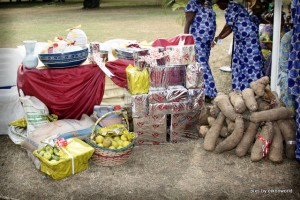Ìgbéyàwó ìbíle ní Ilẹ̀ Yorùbá jẹ́ àsìkò ti ẹbí ọkọ àti ì̀yàwó ma nparapọ. Ìyàwó ṣíṣe ni ilẹ̀ Yorùbá kò pin sí ãrin ọkọ àti ìyàwó nikan, ohun ti ẹbí nparapọ ṣe pẹ̀lú ìdùnnú nípàtàkì lati gbà wọ́n níyànjú àti lati gba àdúrà fún wọn.
A lè ṣe gbogbo ètò ìgb́eyàwó ìbílẹ̀ ni ọjọ́ kan tàbí ọjọ́ púpọ̀ fún àpẹrẹ: mọ̀mí-nmọ̀ẹ lọjọkan ati idana lọ́jọ́ keji tàbi ọjọ miran. Ní ayé àtijọ́, nígbàtí Yorùbá ma nṣe ayẹyẹ níwọ̀ntúnwọ̀sín, ilé ẹbí tàbi ọgbà bàbá àti ìyá iyawo ni wọn ti nṣe ayẹyẹ ìgbéyàwó, ṣùgbọ́n láyé òde òní, àyè ọ̀tọ̀ bi ilé ìlú, pápá ìṣeré, ilé àlejò àti bẹ̃bẹ lọ ni wọ́n nlo. Àṣà gbígba àyè ọ̀tọ tógbòde bẹ̀rẹ̀ nítorí àwọn adigun jalè àti àwọn ènìyàn burúkú míràn ti o ma ndarapọ pẹ̀lú àwọn àlejò tí a pè sí ibi ìyàwó lati ṣe iṣẹ́ ibi. Owó púpọ ni ọ̀pọ̀lọpọ̀ ma nfi gba à̀yè ibi ṣíṣe ìyàwó.
Bí òbí ba ti lọ́lá tó ni wọn ma náwó tó, nitori ìdùnnú ni fún òbí pé a tọ́mọ, wọ́n gbẹ̀kọ́, wọn fẹ di òmìnira lati bẹ̀rẹ̀ ẹbí tíwọn, ṣùgbọ́n àṣejù ati àṣehàn ti wa wọ́pọ̀ jù. Nítorí ìnáwó ìgbéyàwó, ilé ayẹyẹ pọ̀ju ilé ìkàwé lọ láyé òde òní. Kí ṣe bi a ti náwó tó níbi ìgbéyàwó lo nmu àṣeyorí ba ọkọ àti ìyàwo, ọ̀pọ̀lọpọ̀ ntuka láìpẹ́ lẹ́hin ariwo rẹpẹtẹ yi. Yorùbá ni “A ki fọlá jẹ iyọ̀”, nínú ìṣẹ layika ni ilẹ̀ Aláwọdúdú, ó yẹ ki a ṣe ayẹyẹ ìgbéyàwó níwọ̀ntúnwọ̀nsìn. Ẹ fojú sọ́nà fún ètò ìgbéyàwó ibilè.
ENGLISH TRANSLATION
Traditional Marriage in Yoruba land is a period when the groom and the bride’s family come together, and it is not just an affair between the bride and groom. It is a joyous event that brings both families together to advice and to pray for the bride and groom.
All the marriage ceremonies can be conducted in a day or spread over many days as in the old days when the family Introduction would often be on one day while the traditional marriage was expected to occur on another date. In the olden days, when Yoruba marriage were most often conducted moderately, the ceremony was held in the family house or in the bride’s parent’s home, but nowadays, it is mostly conducted in a rented place such as community hall, sport field, hotel, etc. The culture of hiring a neutral venue began as a result of armed robbery attacks and unscrupulous elements infiltrating the invited guests to cause havoc. These venues are often secured with a lot of money.
The wealth of the parents often determines how expensive the marriage could be, because it is a thing of joy that children have been trained and they now want to be independent to start their family, but there is now a lot of excesses and show off. As a result of the huge cost of marriage, there are more event places than libraries. It is not how expensive that makes a marriage successful, as many marriages are dissolved almost immediately after the huge ceremony. There is a Yoruba saying that “salt is not consumed according to wealth”, in the midst of poverty in Africa, it is better to conduct a moderate marriage ceremony. Look out for more series on traditional marriage…
Originally posted 2013-04-12 21:00:05. Republished by Blog Post Promoter



